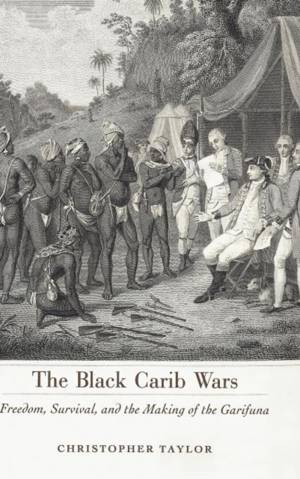
- Retrait gratuit dans votre magasin Club
- 7.000.000 titres dans notre catalogue
- Payer en toute sécurité
- Toujours un magasin près de chez vous
- Retrait gratuit dans votre magasin Club
- 7.000.0000 titres dans notre catalogue
- Payer en toute sécurité
- Toujours un magasin près de chez vous
186,95 €
+ 373 points
Description
In The Black Carib Wars, Christopher Taylor offers the most thoroughly researched history of the struggle of the Garifuna people to preserve their freedom on the island of St. Vincent. Today, thousands of Garifuna people live in Honduras, Belize, Guatemala, Nicaragua, and the United States, preserving their unique culture and speaking a language that directly descends from that spoken in the Caribbean at the time of Columbus. All trace their origins back to St. Vincent where their ancestors were native Carib Indians and shipwrecked or runaway West African slaves--hence the name by which they were known to French and British colonialists: Black Caribs. In the 1600s they encountered Europeans as adversaries and allies. But from the early 1700s, white people, particularly the French, began to settle on St. Vincent. The treaty of Paris in 1763 handed the island to the British who wanted the Black Caribs' land to grow sugar. Conflict was inevitable, and in a series of bloody wars punctuated by uneasy peace the Black Caribs took on the might of the British Empire. Over decades leaders such as Tourouya, Bigot, and Chatoyer organized the resistance of a society which had no central authority but united against the external threat. Finally, abandoned by their French allies, they were defeated, and the survivors deported to Central America in 1797. The Black Carib Wars draws on extensive research in Britain, France, and St. Vincent to offer a compelling narrative of the formative years of the Garifuna people.
Spécifications
Parties prenantes
- Auteur(s) :
- Editeur:
Contenu
- Nombre de pages :
- 224
- Langue:
- Anglais
- Collection :
Caractéristiques
- EAN:
- 9781617033100
- Date de parution :
- 16-04-12
- Format:
- Livre relié
- Format numérique:
- Genaaid
- Dimensions :
- 152 mm x 229 mm
- Poids :
- 489 g

Les avis
Nous publions uniquement les avis qui respectent les conditions requises. Consultez nos conditions pour les avis.






